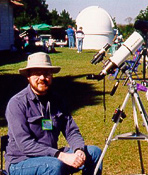<<PREVIOUS -
HOME -
CONTENTS -
NEXT>>
DOUBLE STARS INDEX -
![]()
<<PREVIOUS -
HOME -
CONTENTS -
NEXT>>
DOUBLE STARS INDEX -
![]()
DSLR & Bayer Conversion Settings
AIP4WIN has two settings windows that need to be configured in order to read a Canon raw CR2 file.
The first settings window is the Bayer Array -> Color window that tells AIP4WIN which of the four types of Bayer arrays is being used by the camera. The Canon raw CR2 file uses the first Bayer type called red, green, green and blue as shown below.

The second AIP4WIN settings window is the DSLR & Bayer Conversion Settings window. For science image analysis use Bi-Linear Interpolation for the De-Bayerization algorithm (private communication with Richard Berry).
DeBayer, Convert Color to Grayscale set all RGB scales to 1.0.

Opening DSLR Image in AIP4WIN
Open the Canon raw CR2 file. In Image Display Control the User Black/White values are adjusted to show the image without the background noise. Usually only the White point needs to be increased.

AIP4WIN Image Display Settings
In Image Display Control the User Black/White values are adjusted to show the image without the background noise. Usually only the White point needs to be increased.

The Image Display Control Zoom is adjusted to 25% see the complete image which will be necessary when the astrometry analysis is done.

Links ![]()
References
|
|

Thomas G. Frey Thomas G. Frey is Professor Emeritus of Chemistry at California Polytechnic State University, San Luis Obispo, CA. He has been an active member of the Central Coast Astronomical Society for over 25 years. He was a team leader at the Pine Mountain Observatory (PMO) Summer Science Research Work- shop, Bend, OR, 2009 and co-director of the PMO workshop, summer of 2011. |
|
|

David Haworth enjoys astronomy imaging and processing those images to bring out details that cannot be seen easily by visual observing with the same size optics. David Haworth started astroimaging with a Cookbook CCD camera he built in 1996 and since then has used many types of cameras to image the sky. David wrote Chapter 2: "Afocal Photography with Digital Cameras" in the second edition of "The Art and Science of CCD Astronomy" which was published in December 2005. David's images have appeared in magazine front covers, articles, books, catalogs, videos, music CD covers, T-shirts, other web sites, etc. |